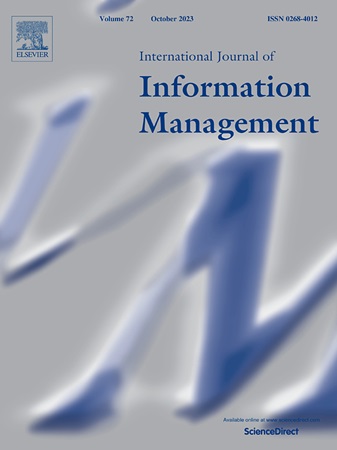对放手感觉良好吗?在公民接受电子身份识别应用的过程中,学会了无助感和隐私微积分
IF 27
1区 管理学
Q1 INFORMATION SCIENCE & LIBRARY SCIENCE
International Journal of Information Management
Pub Date : 2025-05-27
DOI:10.1016/j.ijinfomgt.2025.102928
引用次数: 0
摘要
本研究运用习得性无助理论和隐私微积分理论,探讨了隐私无助如何影响公民在使用电子身份识别(eID)应用时的利益-隐私权衡。以越南为研究背景,调查了潜在的eID应用程序用户,以揭示隐私无助感如何影响他们的eID应用程序使用决策。偏最小二乘结构方程模型的研究结果表明,在决定安装应用程序时,个人会进行利益与隐私的权衡,隐私无助调节了享乐价值与感知利益之间、使用可能性与预期幸福感之间的关系。这些结果表明,经历高度隐私无助的公民从使用eID应用程序中获得了更大的乐趣,并预期他们的主观幸福感会得到改善。模糊集定性比较分析(fsQCA)进一步揭示,尽管存在隐私问题和有限的感知价值,个体仍愿意使用eID应用程序,这表明隐私无助可以取代利益-隐私等式中的感知利益。FsQCA还显示,缺乏实用价值是阻碍eID应用使用的关键因素。本研究通过阐明隐私无助在利益-隐私权衡中的作用,为理论提供了帮助。具体来说,虽然之前的工作主要关注无助的负面结果,但我们的研究结果强调了它将公民的注意力转向享乐价值和预期幸福的潜力。此外,本研究提出了对理论焦点的重新考虑,认为技术采用可能意味着对保护措施的放弃,而不是纯粹的接受。该研究总结了一些实用的道德策略建议,以促进eID应用的使用,而不是利用隐私无助感。本文章由计算机程序翻译,如有差异,请以英文原文为准。
Feeling good about letting go? Learned helplessness and privacy calculus in citizen acceptance of electronic identification apps
Drawing on learned helplessness theory and privacy calculus theory, this research investigates how privacy helplessness influences citizens’ benefit-privacy trade-offs in using electronic identification (eID) apps. Using Vietnam as a research context, potential eID app users were surveyed to uncover how a sense of privacy helplessness influences their eID app usage decisions. Findings from the partial least squares structural equation modeling showed that individuals engage in benefit-privacy trade-offs when deciding to install the app, and that privacy helplessness moderated the relationships between hedonic value and perceived benefit, and between usage likelihood and anticipated well-being. These results indicate that citizens experiencing high privacy helplessness derive greater enjoyment from using eID apps and anticipate improvements in their subjective well-being. Fuzzy-set qualitative comparative analysis (fsQCA) further revealed that individuals are willing to use eID apps despite privacy concerns and limited perceived value, suggesting that privacy helplessness can supplant perceived benefit in the benefit-privacy equation. FsQCA also showed that a lack of perceived utilitarian value is a key deterrent to eID app usage. This research contributes to theory by elucidating the role of privacy helplessness in benefit-privacy trade-offs. Specifically, while prior work focuses on the negative outcomes of helplessness, our findings highlight its potential to shift citizens’ attention towards hedonic value and anticipated well-being. Furthermore, this study proposes a reconsideration of the theoretical focus, suggesting that technology adoption may signify resignation to protection measures instead of pure acceptance. The research concludes with practical recommendations for ethical strategies to promote eID app usage rather than capitalizing on privacy helplessness.
求助全文
通过发布文献求助,成功后即可免费获取论文全文。
去求助
来源期刊

International Journal of Information Management
INFORMATION SCIENCE & LIBRARY SCIENCE-
CiteScore
53.10
自引率
6.20%
发文量
111
审稿时长
24 days
期刊介绍:
The International Journal of Information Management (IJIM) is a distinguished, international, and peer-reviewed journal dedicated to providing its readers with top-notch analysis and discussions within the evolving field of information management. Key features of the journal include:
Comprehensive Coverage:
IJIM keeps readers informed with major papers, reports, and reviews.
Topical Relevance:
The journal remains current and relevant through Viewpoint articles and regular features like Research Notes, Case Studies, and a Reviews section, ensuring readers are updated on contemporary issues.
Focus on Quality:
IJIM prioritizes high-quality papers that address contemporary issues in information management.
 求助内容:
求助内容: 应助结果提醒方式:
应助结果提醒方式:


